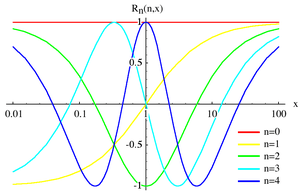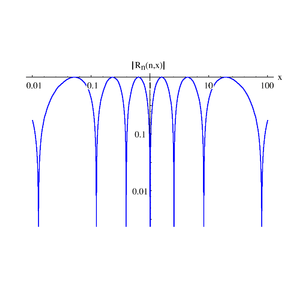Chebyshev rational functions
- This article is not about the Chebyshev rational functions used in the design of elliptic filters. For those functions, see Elliptic rational functions.

Plot of the Chebyshev rational functions for n = 0, 1, 2, 3 and 4 for x between 0.01 and 100.
In mathematics, the Chebyshev rational functions are a sequence of functions which are both rational and orthogonal. They are named after Pafnuty Chebyshev. A rational Chebyshev function of degree n is defined as:
where is a Chebyshev polynomial of the first kind.
Properties
Many properties can be derived from the properties of the Chebyshev polynomials of the first kind. Other properties are unique to the functions themselves.
Recursion
Differential equations
Orthogonality

Plot of the absolute value of the seventh order (n = 7) Chebyshev rational function for x between 0.01 and 100. Note that there are n zeroes arranged symmetrically about x = 1 and if x0 is a zero, then 1/x0 is a zero as well. The maximum value between the zeros is unity. These properties hold for all orders.
Defining:
The orthogonality of the Chebyshev rational functions may be written:
where equals 2 for n = 0 and equals 1 for and is the Kronecker delta function.
Expansion of an arbitrary function
For an arbitrary function the orthogonality relationship can be used to expand :
where
Particular values
Partial fraction expansion
References
- Ben-Yu, Guo; Jie, Shen; Zhong-Qing, Wang (2002). "Chebyshev rational spectral and pseudospectral methods on a semi-infinite interval" (PDF). Int. J. Numer. Meth. Engng. 53: 65–84. doi:10.1002/nme.392. Retrieved 2006-07-25.
This article is issued from Wikipedia - version of the 12/9/2015. The text is available under the Creative Commons Attribution/Share Alike but additional terms may apply for the media files.